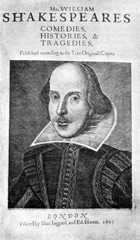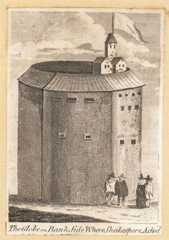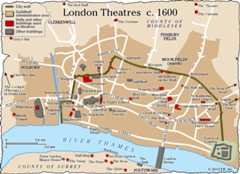William Shakespeare
Our editors will review what you’ve submitted and determine whether to revise the article.
- Shakespeare also spelled:
- Shakspere
- Byname:
- Bard of Avon or Swan of Avon
- Baptized:
- April 26, 1564 ,Stratford-upon-Avon,Warwickshire,England
- Died:
- April 23, 1616 ,Stratford-upon-Avon
- Notable Works:
- “A Midsummer Night’s Dream”
- “All’s Well That Ends Well”
- “Antony and Cleopatra”
- “As You Like It”
- “Coriolanus”
- “Cymbeline”
- First Folio
- “Hamlet”
- “Henry IV, Part 1”
- “Henry IV, Part 2”
- “Henry V”
- “Henry VI, Part 1”
- “Henry VI, Part 2”
- “Henry VI, Part 3”
- “Henry VIII”
- “Julius Caesar”
- “King John”
- “King Lear”
- “Love’s Labour’s Lost”
- “Macbeth”
- “Measure for Measure”
- “Much Ado About Nothing”
- “Othello”
- “Pericles”
- “Richard III”
- “The Comedy of Errors”
- “The Merchant of Venice”
- “The Merry Wives of Windsor”
- “The Taming of the Shrew”
- “The Tempest”
- “Timon of Athens”
- Movement / Style:
- Jacobean age
- Notable Family Members:
- spouseAnne Hathaway
What was Shakespeare’s family like?
Shakespeare marriedAnne Hathaway, eight years his senior, when he was 18. They had three children: Susanna and twins Judith and Hamnet. Hamnet died at the age of 11.
How many plays did Shakespeare write?
There is some dispute about how many plays Shakespeare wrote. The general consensus is 37.
How many sonnets did Shakespeare write?
Shakespeare wrote 154sonnets. The most famous include Sonnet 18, with opening lines “Shall I compare thee to a summer’s day?”, and Sonnet 130, which begins “My mistress’ eyes are nothing like the sun.”
How did Shakespeare die?
The cause of Shakespeare’s death is unknown. However, the vicar of the local church wrote in his journal some fifty years later that “Shakespeare,Drayton, andBen Jonson had a merry meeting, and it seems drank too hard; for Shakespeare died of a fever there contracted.” The account cannot be verified but has led some scholars to speculate that Shakespeare may have died of typhus.
Why is Shakespeare still important today?
Shakespeare remains vital because his plays present people and situations that we recognize today. His characters have an emotional reality that transcends time, and his plays depict familiar experiences, ranging from family squabbles to falling in love to war. The fact that his plays are performed and adapted around the world underscores the universal appeal of his storytelling.
News•
William Shakespeare (baptized April 26, 1564, Stratford-upon-Avon, Warwickshire, England—died April 23, 1616, Stratford-upon-Avon) was a poet, dramatist, and actor often called the English national poet. He is considered by many to be the greatest dramatist of all time.
Shakespeare occupies a position unique in worldliterature. Other poets, such asHomer andDante, and novelists, such asLeo Tolstoy andCharles Dickens, havetranscended national barriers, but no writer’s living reputation can compare to that of Shakespeare, whose plays, written in the late 16th and early 17th centuries for a smallrepertory theatre, are now performed and read more often and in more countries than ever before. The prophecy of his great contemporary, the poet and dramatistBen Jonson, that Shakespeare “was not of an age, but for all time,” has been fulfilled.
It may beaudacious even to attempt a definition of his greatness, but it is not so difficult to describe the gifts that enabled him to create imaginative visions ofpathos and mirth that, whether read or witnessed in the theatre, fill the mind and linger there. He is a writer of greatintellectual rapidity, perceptiveness, and poetic power. Other writers have had these qualities, but with Shakespeare the keenness of mind was applied not toabstruse or remote subjects but to human beings and their complete range of emotions and conflicts. Other writers have applied their keenness of mind in this way, but Shakespeare is astonishingly clever with words and images, so that his mental energy, when applied to intelligible human situations, finds full and memorable expression, convincing and imaginatively stimulating. As if this were not enough, the art form into which his creative energies went was not remote and bookish but involved the vivid stage impersonation of human beings, commanding sympathy and invitingvicarious participation. Thus, Shakespeare’s merits can survive translation into other languages and intocultures remote from that of ElizabethanEngland.
Shakespeare the man
Life
Although the amount of factual knowledge available about Shakespeare is surprisingly large for one of his station in life, many find it a little disappointing, for it is mostly gleaned from documents of an official character. Dates ofbaptisms,marriages,deaths, andburials;wills,conveyances, legal processes, and payments by the court—these are the dusty details. There are, however, many contemporaryallusions to him as a writer, and these add a reasonable amount of flesh and blood to the biographical skeleton.
Early life in Stratford
Theparish register of Holy Trinity Church inStratford-upon-Avon ,Warwickshire, shows that he was baptized there on April 26, 1564; his birthday is traditionally celebrated on April 23. His father,John Shakespeare, was a burgess of theborough, who in 1565 was chosen analderman and in 1568 bailiff (the position corresponding tomayor, before the grant of a further charter to Stratford in 1664). He was engaged in various kinds of trade and appears to have suffered some fluctuations inprosperity. His wife, Mary Arden, of Wilmcote, Warwickshire, came from an ancient family and was theheiress to some land. (Given the somewhat rigid social distinctions of the 16th century, this marriage must have been a step up the social scale for John Shakespeare.)

Stratford enjoyed agrammar school of good quality, and the education there was free, the schoolmaster’s salary being paid by the borough. No lists of the pupils who were at the school in the 16th century have survived, but it would be absurd to suppose the bailiff of the town did not send his son there. The boy’s education would consist mostly ofLatin studies—learning to read, write, and speak thelanguage fairly well and studying some of the Classical historians, moralists, and poets. Shakespeare did not go on to the university, and indeed it is unlikely that the scholarly round of logic,rhetoric, and other studies then followed there would have interested him.
Instead, at age 18 he married. Where and exactly when are not known, but the episcopal registry atWorcester preserves a bond dated November 28, 1582, and executed by two yeomen of Stratford, named Sandells and Richardson, as a security to thebishop for the issue of a license for the marriage of William Shakespeare and “ Anne Hathaway of Stratford,” upon the consent of her friends and upon once asking of the banns. (Anne died in 1623, seven years after Shakespeare. There is good evidence to associate her with a family of Hathaways whoinhabited a beautiful farmhouse, now much visited, 2 miles [3.2 km] from Stratford.) The next date of interest is found in the records of the Stratford church, where a daughter, named Susanna, born to William Shakespeare, was baptized on May 26, 1583. On February 2, 1585, twins were baptized, Hamnet and Judith. (Hamnet, Shakespeare’s only son, died 11 years later.)

How Shakespeare spent the next eight years or so, until his name begins to appear inLondon theatre records, is not known. There are stories—given currency long after his death—of stealing deer and getting into trouble with a local magnate,Sir Thomas Lucy of Charlecote, near Stratford; of earning his living as a schoolmaster in the country; of going to London and gaining entry to the world of theatre by minding the horses of theatregoers. It has also been conjectured that Shakespeare spent some time as a member of a great household and that he was a soldier, perhaps in theLow Countries. In lieu of external evidence, such extrapolations about Shakespeare’s life have often been made from the internal “evidence” of his writings. But this method is unsatisfactory: one cannot conclude, for example, from his allusions to the law that Shakespeare was a lawyer, for he was clearly a writer who without difficulty could get whatever knowledge he needed for thecomposition of his plays.























